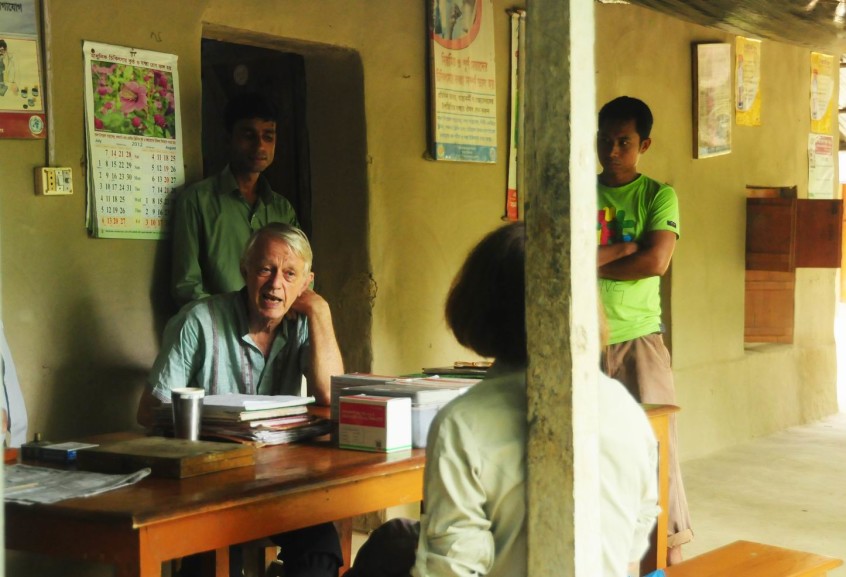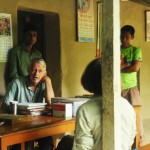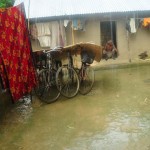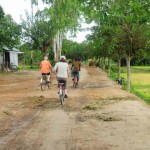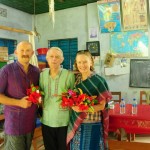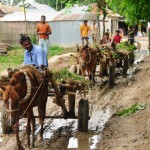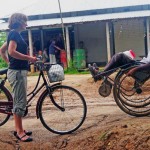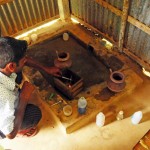
Edric explains to Jo Morgan the philosophy of heath care for the poor by the poor, and the efforts to enable impoverished people to care for their own
As well as being in India to follow our beloved Phoenix, Jo and I have been visiting one of our Morgan Foundation foreign aid projects in Bangladesh and it has been a very special opportunity to see the on-the-ground work of one of our most special, Kiwi Heroes.
Deep in the heart of rural Bangladesh, home to some of the most impoverished people on earth lies the Kailakuri Health Centre, creation of Dr Edric Baker a New Zealander who has devoted the last 33 years of his life to creating a unique formula of providing health care for the impoverished of this populous country. If I were a religious person I would describe this man as a modern day saint. That New Zealanders still know so very little of his work is somewhat of a testimony to our isolation from the world at large, our exclusion of ex-pat New Zealanders performing outside of the corporate sector.
There is no access to free public health care in Bangladesh, you need money. That locks out the poor and the destitute who comprise much of the population. No wonder their maternal mortality rate is 24 times ours, their infant mortality rate ten times, and their life expectancy for those that make it to a live birth, 72% of ours.
Edric’s formula is no-frills medical care that can be administered by his team of paramedics drawn from the target patient population (and the education levels of most of whom are well below School C) under supervision from a qualified doctor. For the ongoing financial viability of the project it’s critical that his no-frills approach is maintained. The sustainability of the hospital and health outreach services would quickly disappear if
(a) More expensive drugs than necessary were purchased, a feature common in modern health care systems who must have the latest and are susceptible to the marketing hype of Pharma.
(b) Administrators tried to “upgrade” methods to those found in modern hospitals – such as having beds, computer systems etc.
(c) Replacing staff with medically-trained professionals on (even Bangladeshi) market salaries
(d) Dropping the patient support model wherein a family member is required to accompany the inpatient to hospital to perform the requisite nursing duties. If Kailakuri had to employ nurses the project would implode.
(e) The centre provided transport services for incapacitated patients – families bring their needy in using what transport they can afford, often a local cycleshaw
What Edric has achieved is truly phenomenal and the essence of his “care for the poor by the poor” has been establishing a methodology attuned to the health needs of this otherwise ignored patient group, a service that can be maintained and implemented in large by this target patient group itself requiring very little in the way of outside intervention. A dependence on such intervention would expose the service to the risk of collapse at the whim of any removal or reduction in such an intervention.
This man, who lives a simple but busy life with next to no personal possessions of his own, has a quality most of us are in awe of. The sheer volume of annual health care his operation gets through each year – 33,000 outpatients, 1,000 inpatients, and 21,000 receiving health education – for an annual total budget equating to the salaries of just two NZ city council middle managers, is something I would hope would make New Zealanders sit up and reflect upon how fat, frivolous and unproductive our own lifestyle could be described. Problems? We don’t appreciate the meaning of the word.
- Edric explains to Jo Morgan the philosophy of heath care for the poor by the poor, and the efforts to enable impoverished people to care for their own
- Doctor in the House
- Home visits for rural people can involve considerable distances, the beauty of the Bangladeshi countryside an added bonus
- Kids, gorgeous always, when the crop is in, or when it fails
- In the presence of someone very special – Dr Edric Baker
- Not always easy for the ambulance to get through
- A chance meeting in the street, one of Kailakuri’s senior health educationalists debates practices with Joanne
- Glucometers are well beyond the budget of diabetes patients so they are provided a chemical solution, costing pennies per month, which when mixed with their urine provides a colour indicator of blood sugar level.

